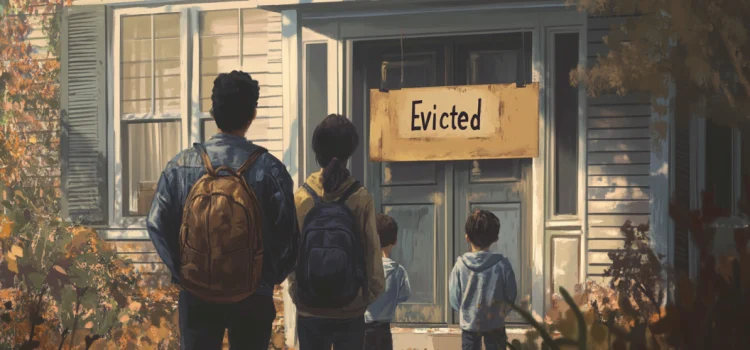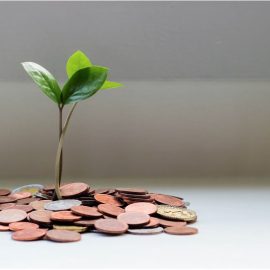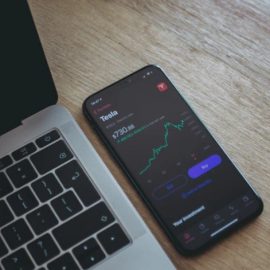

This article is an excerpt from the Shortform book guide to "Evicted" by Matthew Desmond. Shortform has the world's best summaries and analyses of books you should be reading.
Like this article? Sign up for a free trial here.
What is the cycle of poverty and eviction? Why is it so difficult to escape the cycle? How can this lead to crime?
Sociologist Matthew Desmond argues that it’s nearly impossible to break out of the cycle of poverty and eviction because each situation exacerbates the other. Some who end up in this loop end up living in motels or even turning to crime.
Continue reading for a deeper look at the poverty-eviction cycle.
The Poverty-Eviction Cycle
Naturally, poverty is a major cause of evictions—however, Desmond says that eviction also causes or worsens poverty. This happens because eviction disrupts people’s lives and finances, making things even more difficult for those who were already struggling. As a result, many low-income people find themselves trapped in a cycle of poverty and evictions that can be nearly impossible to break out of.
(Shortform note: Frequent evictions are just one way that, paradoxically, living in poverty can be very expensive. Discworld author Sir Terry Pratchett had one of his characters describe this phenomenon, somewhat humorously, as the Boots Theory of Socioeconomic Unfairness. In the book Men at Arms, a policeman named Sam Vimes explains that he doesn’t make enough money to afford good boots for his job, so he’s forced to buy cheap boots that wear out much more quickly. Expanding on that example, Vimes estimates that a poor person might spend twice as much on boots as a wealthy person does over the course of ten years—and the poor person would still frequently suffer from wet feet.)
Scrambling to find a new place to live is already difficult and stressful, but the author says that eviction creates problems well beyond that. First and foremost, people are likely to miss work or benefits appointments while searching for a new apartment. If they can’t find anything in the same area, they’ll probably lose their job entirely.
Second, people with evictions on their record have an even harder time finding someplace new to live, because most landlords will view them as an unacceptable risk. This drives them to seek housing with landlords who specialize in exploiting low-income renters—we’ll discuss these predatory landlords in the next section.
(Shortform note: Some people in this situation resort to living in motels, which are not suitable as long-term homes. Though they usually intend the motel to be a temporary solution, the cost of staying there can prevent low-income people from saving up enough money to rent a new apartment. One survey of families living in motels found that nearly half of them had been there for at least six months, and 10% had been there for more than two years.)
Desmond adds that desperate people may turn to stealing and other criminal activity to make ends meet. However, having a criminal record makes it even more difficult to find housing and work in the US, which further perpetuates this cycle. Therefore, many former prisoners have no choice but to go right back to crime after getting out of prison.
(Shortform note: The US justice system tends to focus on punishing people for their crimes, on the assumption that they won’t reoffend out of fear of further punishment. However, studies have shown that rehabilitation is more effective—and cheaper—than punishment-focused prison systems. When prisoners receive health care and mental health treatment, learn marketable skills, and have the opportunity for an education, they’re far less likely to reoffend after release. Researchers believe this is because rehabilitation addresses the reasons why people turn to crime in the first place; by giving people the skills and support they need to make a decent living, it eliminates the need to support themselves through crime.)
Psychological Impacts of the Poverty-Eviction Cycle
Desmond says that the cycle of poverty and eviction also causes serious harm to people’s mental and emotional well-being. In fact, eviction often leads to clinical depression and even suicide. There are several reasons for this.
First of all, not having a stable home is extremely stressful. Low-income renters live with the constant threat of losing their homes and possessions, which causes them a great deal of anxiety. Second, people who move frequently don’t get the chance to form strong bonds in their communities, which leaves them feeling isolated and vulnerable. These effects are especially pronounced in families with children, where parents have to worry about keeping their children clothed, fed, and in school on top of everything else.
(Shortform note: Enormous stress is likely inevitable for people living in the poverty-eviction cycle. So, if they can’t escape from the causes of their stress, how might they reduce the impact of that stress? Mayo Clinic suggests taking measures like regular exercise, a healthy diet, meditation, and connecting with others, all of which help reduce the harmful effects of stress on a person’s health and happiness. Some of those suggestions are difficult, if not impossible, for someone who’s using every resource they have—including time—just to stay alive, but even small steps can lead to big improvements. For instance, if someone in this situation can find just five minutes a day to relax and meditate, they might find themselves feeling significantly calmer and more in control of their life.)
The author also says that bad living conditions, such as squalid apartments and frequent moves, are extremely harmful to self-esteem. People who live in those conditions for a long time start to feel like they’re supposed to live that way. They come to believe that they shouldn’t have decent housing, for reasons that might range from personal shortcomings to the will of God.
(Shortform note: While Desmond says that people living in poverty come to believe that they’re supposed to be poor, another explanation is that they’ve simply given up hope. Many low-income people recognize that they’re trapped in the poverty cycle, and they see all the systemic obstacles preventing them from getting back out of it, so they resign themselves to living in poverty. Such people don’t necessarily believe that they’re supposed to be poor, but they understand that they are poor and that there’s very little they can do to change that.)

———End of Preview———
Like what you just read? Read the rest of the world's best book summary and analysis of Matthew Desmond's "Evicted" at Shortform.
Here's what you'll find in our full Evicted summary:
- Why the rate of evictions in the US is even higher now than it was during the Great Depression
- How poverty and eviction each lead to the other
- Ways we can empower citizens to break the cycle of poverty and eviction






